 Petzlover
PetzloverMuggin is originated from United States but Sulimov is originated from Russia. Muggin may grow 36 cm / 14 inches shorter than Sulimov. Muggin may weigh 7 kg / 16 pounds more than Sulimov. Both Muggin and Sulimov has almost same life span. Both Muggin and Sulimov has same litter size. Muggin requires High Maintenance. But Sulimov requires Moderate Maintenance
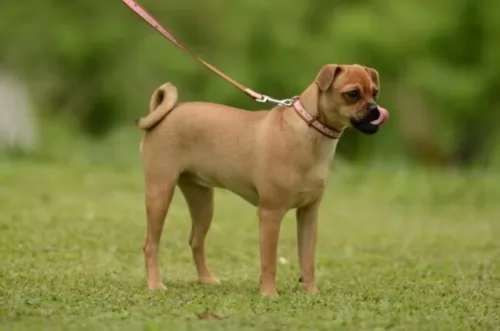 The Muggin is not a purebred dog but rather a cross breed. The hybrid dog population has exploding in the United States in the past ten to fifteen years. A lot of the success of crossbreeding can be attributed to the marketing of these dogs as “Designer Breeds”.
The Muggin is not a purebred dog but rather a cross breed. The hybrid dog population has exploding in the United States in the past ten to fifteen years. A lot of the success of crossbreeding can be attributed to the marketing of these dogs as “Designer Breeds”.
Designer breeds are developed because someone wants some of the characteristics of Breed X and some of the characteristics of Breed Y. Therefore, Designer breed XY is developed. In order to understand this hybrid dog, you need to understand the two purebred breeds they come from. The Muggin is the result of crossing the purebred Pug and the purebred Miniature Pinscher or Min Pin. So, we need to look at the origins of these two purebred breeds.
They are also referred to as Pin Pugs, Min Pin Pug, Pug Pin, Pugscher and were originally the Carlin Pinscher. However, these days there are other breeds besides the Pug and Min Pin making up the gene pool for the Carlin Pinscher. Because of this the Muggin has been separated from the Carlin Pinscher. The American Canine Hybrid Club has accepted the Muggin name for the Pug Min Pin cross.
Pugs are originally a Chinese breed and they were companions rather than working dogs of any kind. During the Han Dynasty they were the dogs of royalty. At the same time there were dogs very much like the pug in Japan and Tibet. The Pugs came to Europe by way of trades with the Dutch who then brought them to Europe. They were named the Mopshond and they caught the eye of the royalty in Europe as well.
Pugs were imported to the United States after the U.S. Civil War and in 1885 they were recognized by the American Kennel Club and called Pugs.
The Min Pin traces its origins to Germany a few hundred years ago. They were “ratters”, guarding the house and stables from all types of vermin. Most dog people believe that the Min Pin is much older than this, perhaps by thousands of years. Yet there is no detailed history to support that. Most believe the breed comes from the German Pinscher line. There might also be some Daschund and Greyhound in that line.
They were once called the Reh Pinscher. This was their name when they came to North America in 1919 and then the breed was renamed in 1972. The Miniature Pinscher Club of America was started in the early 1900’s while the AKC recognized the Min Pin in 1929. Today the Miniature Pinscher is a family dog, a companion.
The Muggin is a loving and loyal dog. All they want is for you to be happy and to share that happiness with them. They can also easily become a one person dog and bond intensely with that one person. They are not a hybrid that you can leave home alone while you go to work for 8 to 10 hours a day. No, the Muggin needs attention and lots of it. Despite this they are great with both kids and other dogs.
Because they are a cross breed, they are not recognized by the American Kennel Club. However, some hybrid registries do recognize the Muggin. These include the Designer Breed Registry, the International Designer Canine Registry, The Designer Dogs Kennel Club, the American Canine Hybrid Club, and the Dog Registry of America.
This Russian jackal-dog-hybrid is thought to have developed from golden jackals and Lapponian Herders. In fact the dog was developed by a certain Klim Sulimov to be a robust security- and sniffer dog at Aeroflot, a Russian airline.
Jackals were used because it is believed that they have a better sense of smell than any domesticated dog there is. The Jackal can also perceive things at a distance. Later on, other dogs were also bred into the line, making it an intelligent dog with an excellent sense of smell.
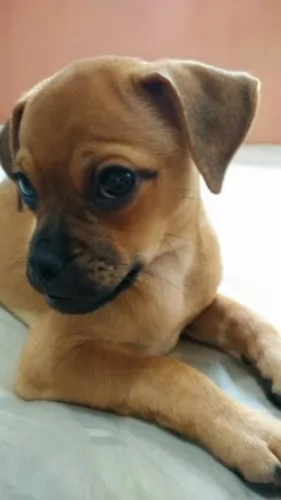 As previously mentioned, the Muggin is a cross between the Pug and the Miniature Pinscher. They are small, shave sturdy legs, floppy ears, and a wrinkled forehead for the most part. Like all hybrids however, all first generation dogs do not look the same. Some might resemble the Min Pin more and others the Pug. Some might have the stockier body of the Pug and the short tail of the Min Pin. Or one could have the Pug’s curly tail and the athletic body of the Min Pin. The snout can be short or long, the ears heavy and floppy or small and thin.
As previously mentioned, the Muggin is a cross between the Pug and the Miniature Pinscher. They are small, shave sturdy legs, floppy ears, and a wrinkled forehead for the most part. Like all hybrids however, all first generation dogs do not look the same. Some might resemble the Min Pin more and others the Pug. Some might have the stockier body of the Pug and the short tail of the Min Pin. Or one could have the Pug’s curly tail and the athletic body of the Min Pin. The snout can be short or long, the ears heavy and floppy or small and thin.
Their coats will usually be fine and short, and colors can vary a lot. They might be black and tan like a Min Pin, or more like a Pug with a solid color of cream, brown, black, white or golden. They also tend to shed quite a bit no matter which parent they take after the most. They will either have brown noses and black eyes or brown eyes and black noses or any combination of black and brown.
If Muggins are only bred to Muggins the second and third generations will resemble each other more than the first generations will. However, at this point many breeders will try to strengthen the breed by occasionally adding in to the gene pool other dog breeds.
Th Sulimov looks like, and also has characteristics of jackals and huskies. The body is large, the ears are triangular and erect, the eyes bright, alert and enquiring and the muzzle is long.
The legs of the dog are slim but strong, like the Jackal and the tail is long and bushy. The coat is fairly long, smooth and thick and can be in a range of colors such as tan, fawn, grey, white and black.
The Sulimov is a medium sized dog and stands at between 40 and 50cm in height and weighs between 12 to 15kg.
This hybrid dog is brave, confident, wily, robust, loving, affectionate and loyal. They are intelligent too and you won’t have any trouble training him.
The truth is, there isn’t much information on the personality of this breed, but they are eager to please, are full of energy and can be cheerful and feisty, even in extreme temperatures.
They’ve been bred for work and aren’t a typical family pet. Because of their wild side, they aren’t recommended for the first time dog owner or for a family pet where there are children.
If you were to keep one, it would be far better suited to life on a farm where it could have a role to play. Life in the city for this active hybrid is out of the question.
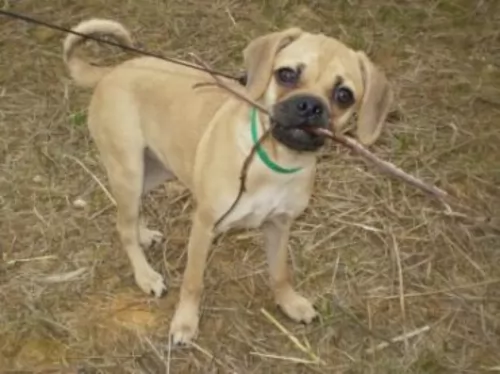 They are good with children but should be supervised.
They are good with children but should be supervised.
Energetic and loving little dogs.
Very adaptable if taken for walks or has space in a yard. Can live anywhere under those circumstances.
Very intelligent but strong willed dog. Needs strong leadership from their person.
The Sulimov makes an excellent working dog and in fact he loves to be busy. They've got an unusual feature - their tails, which are normally curled up and over the back like a husky, hang down limply when tired. Their handler know when these dogs are ready to call it a day.
They are essentially working dogs, being loyal and devoted to their handlers, but wouldn't be considered as an ideal family pet.
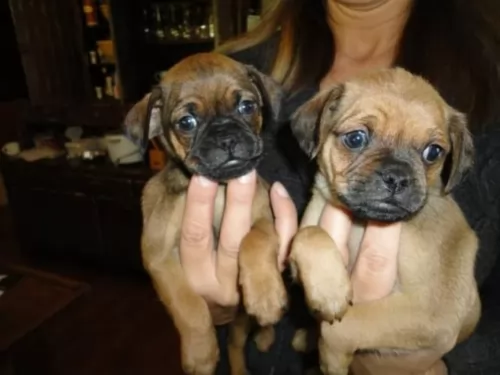 The first generation of Muggins may face all the health issues of either or both their parents, while second and third generations tend to have less health issues, They types of issues the first generation of Muggins might face include:
The first generation of Muggins may face all the health issues of either or both their parents, while second and third generations tend to have less health issues, They types of issues the first generation of Muggins might face include:
Nerve Degeneration – Degenerative Myelopathy or Dm – causes paralysis and eventually fatal.
There is ongoing debate about the health of hybrid dogs against that of purebred dogs. Hybrids inherit genetic dispositions that their parents would have, including certain heath issues.
Parasites are a huge cause of disease in dogs. Apart from ticks and fleas, internal parasites live inside the gastrointestinal tract and can be things like hookworms, tapewarms and roundwarms among others.
Parasites are usually transmitted when the dog ingests parasite eggs in contaminated water, food, feces or soil.
It’s important to get your dog treated as these parasites can cause weight loss, swollen abdomen, malnutrition, diarrhea, vomiting and anemia. Apart from this, they can affect people too. Fortunately these parasites are treatable and easy to prevent.
Other common dog ailments to look out for include bloat, obesity, cancer and hip dysplasia.
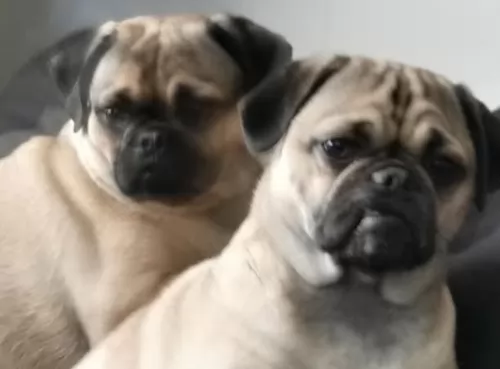 This crossbreed has a definite propensity to overeat and become obese from puppyhood. Feed the puppy a small dog dry food 3-4 times a day a total of ¾ of a cup to 1 cup.
This crossbreed has a definite propensity to overeat and become obese from puppyhood. Feed the puppy a small dog dry food 3-4 times a day a total of ¾ of a cup to 1 cup.
Again don’t over feed the adult Muggin or he will become obese easily. Feed at least twice a day one to one and half cups total.
High Energy
With the athleticism of the Min Pin taking precedence over the less active Pug, the Muggin is a fairly active dog. The Muggin is also not effective by the Pug’s difficulty with heat and cold. They love to go on long walks and need exercise to keep from being bored and destructive. However, remember there is a Pug in your Muggin and if she is not into exercise don’t try to get her to do more than she can.
You do want your Muggin to get enough exercise to fend off any tendency to be overweight. They are good at agility, jogging, obedience and watchdog activities.
This is a medium sized dog so you can buy a high quality dry kibble for him manufactured for medium sized energetic dogs.
Try and avoid the low quality dog foods which come with lots of ingredients that are plain ordinary bad for your dog, and can jeopardize his health.
Try and feed him some home-made food too – boiled chicken, brown rice or pasta and some nutritious vegetables such as spinach,sweet potatoes and carrots. Chop it all up and add some of it to the dry kibble twice a week.
You can also provide him with some raw fish and raw red meat occasionally as this keeps the skin and coat healthy. Make sure he always has fresh, cool water available.
Have him trained and socialized. As it is, for the job he does as a security dog, he is trained and socialized.
Provide him with lots of exercise – walks, ball games, exercises that stimulate mind and body.